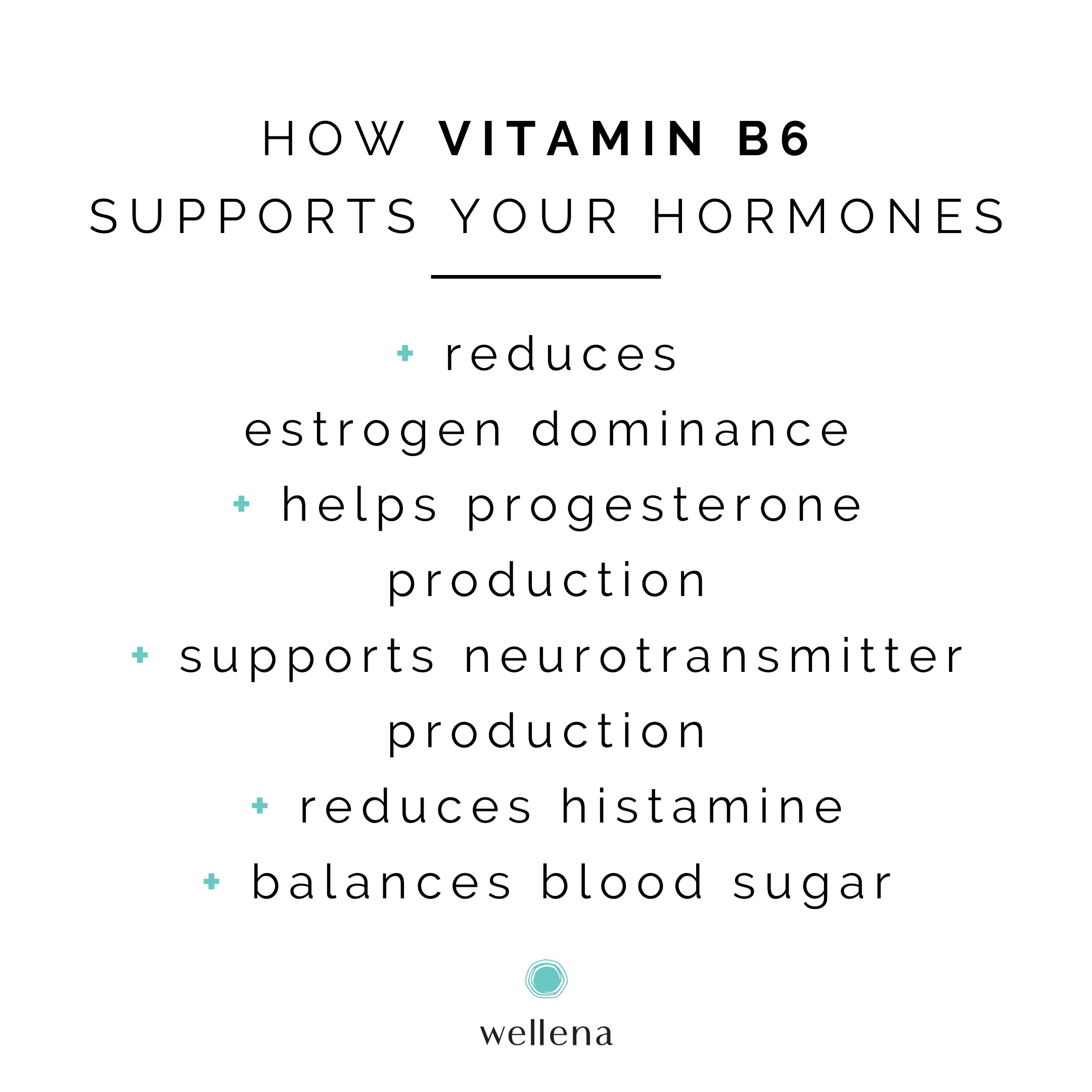What You Will Learn in This Article
- What is Vitamin B6?
- What Are the Symptoms of Deficiency?
- What Are the Benefits of B6 for Hormone Balance?
- Which Foods Contain B6?
- Recommended Dosage
- My Recommended Brand of B6
What is Vitamin B6?
Vitamin B6, otherwise known as Pyridoxine, is a water-soluble vitamin that is required for over 100 enzyme reactions in the body. A couple of these enzyme reactions are the conversion of the amino acid L-DOPA to the neurotransmitter dopamine and the conversion of the amino acid 5-HTP to serotonin.
Dopamine and serotonin are signaling compounds in the body that help you feel good. These neurotransmitters help support balanced moods, a positive mental outlook, and a healthy response to occasional stress.
Neurotransmitters can sometimes act as hormones or aid in the release of hormones in the body. Likewise, hormones can have neurotransmitter-like effects, impacting mood and brain health. So it’s important that our nutrition supports the balance of both neurotransmitters and hormones.
Additional roles for vitamin B6 include the healthy metabolism of proteins, proper hormone signaling, and the synthesis of heme, the oxygen-transporting portion of hemoglobin in the blood. For these reasons, adequate B6 levels may help maintain steady energy levels.
Since the body cannot produce vitamin B6, it has to be taken in through our diet or from supplementation.
While vitamin B6 is present throughout the food supply (foods listed below), absorption may be impaired due to decreased kidney or liver function, malabsorption in the digestive tract (especially in Celiac Disease, IBD, or bariatric surgery), autoimmune disease, chronic alcohol dependence, or drug interactions. As a result, increased supplementation may be required.
Some medications that may interfere with the absorption of B6 from foods include oral contraceptives and NSAIDs (non-steroidal anti-inflammatory drugs).
The vitamin B complex is made up of eight B vitamins that all work together to keep the body working optimally. To learn about the other B vitamins with deficiency checklists and food sources, read this article.
What Are the Symptoms of Deficiency?
Low B6 levels may cause:
- Poor dream recall or nightmares
- Water retention
- Low stomach acid (hence GERD or acid reflux)
- High homocysteine levels (a sign of inflammation)
- Low energy
- Anemia (iron deficiency or low ferritin)
- Convulsions/spasms
- Headaches or migraines
- Nausea, especially in the mornings
- A tendency toward motion sickness
- Low B12 levels, despite supplementation
- Foods high in oxalates cause kidney stones, vulvodynia, and pain.

A chronic deficiency of vitamin B6 and zinc may indicate a condition called Pyroluria – social anxiety and irrational fears. Learn more and determine whether you’re likely to experience it here.
What Are the Benefits of B6 for Hormones?
Vitamin B6 benefits hormones and neurotransmitters in several ways as it brings balance throughout the body.
1. B6 Helps Reduce Estrogen Dominance
In phase 2 of liver detoxification, known as “conjugation,” toxins are combined with another compound that will safely escort them out of the body. Vitamin B6, along with B12, folate, and beets (root and leaves) support the methylation pathway that clears estrogen from the body.
Read more about the liver and how methylation helps support hormone balance here. Or, for a more comprehensive explanation of estrogen dominance and how vitamins and nutrients can help, see this interview with Christa Orecchio.
2. B6 Plays a Role in Progesterone Production
Part of reducing estrogen dominance involves restoring the balance between estrogen and progesterone. In a study of women with premenstrual tension who dealt with anxiety and irritability, vitamin B6 given at 200-800 mg per day was shown to reduce estrogen and increase progesterone, improving symptoms.
Progesterone can stimulate the production of the neurotransmitter Gamma-Aminobutyric Acid (GABA), which can help relieve symptoms of PMS.

3. B6 Plays a Role in Neurotransmitter Production
Vitamin B6 in its active form, P5P, is needed for tryptophan to be metabolized into the neurotransmitter serotonin, and subsequently, into melatonin. In that way, B6 has a positive effect on both mood and sleep.
Supplementation with Vitamin B6 also helps with the production of the neurotransmitter, GABA. B6 is needed for the enzyme Glutamate decarboxylase to convert the amino acid, glutamine, into calming GABA (and preventing its conversion to excitatory glutamate).
Active B6 (P5P) supports the conversion of the amino acid L-DOPA to the neurotransmitter dopamine and deficiency of B6 prevents the synthesis of dopamine in the brain.
4. B6 Reduces Histamine
Vitamin B6 is required for the functioning of diamine oxidase (DAO), an enzyme that helps break down histamine in the body. Without adequate levels of DAO, histamine levels can increase, leading to symptoms of histamine intolerance or Mast Cell Activation Disorder (MCAD).
Histamine is a biogenic amine, but it can also act as an excitatory neurotransmitter. High histamine can contribute to PMS.
Vitamin B6’s ability to raise progesterone can also help to reduce histamine levels. Estrogen stimulates mast cells to produce more histamine, and histamine consequently stimulates the production of more estrogen. It’s a vicious cycle which vitamin B6 may help break.

5. Vitamin B6 Helps Balance Blood Sugar
B6 levels tend to be lower in those with Type 2 Diabetes. In a study of Caucasian men with Type 2 Diabetes, 6 weeks of 150 mg per day of vitamin B6 lowered hemoglobin A1C levels (an average of blood sugar levels over 2-3 months’ time).
Vitamin B6 also seems to help women with gestational diabetes. In a small study of women with gestational diabetes mellitus, 100 mg of vitamin B6 per day over a 2 week period significantly improved glucose tolerance.
B6 may also prevent insulin resistance. In an animal study, vitamin B6 at 50 mg/kg/day improved the tolerance of both glucose and insulin.

Which Foods Contain Vitamin B6?
Foods that are high in vitamin B6 include tuna, beef (especially beef liver), spinach, cabbage, bok choy, broccoli, kale, collard greens, bell peppers, carrots, turnip greens, beet greens, swiss chard, asparagus, walnuts, eggs, sockeye salmon, poultry, sweet potatoes, potatoes, sunflower seeds, garlic, pinto beans, and maca root.
You can learn how to add more hormone-balancing ingredients to your meals with our FREE 19 Estrogen Balancing Superfoods Guide here.
Recommended Dosage (How Much Vitamin B6 is Too Much?)
The optimal daily dose of Vitamin B6 is 25 to 50 mg. Do not exceed the tolerable upper limit of 100 mg/day.
Overdosing can cause:
- A lack of muscle control or coordination of voluntary movements (ataxia)
- Painful, disfiguring skin lesions
- Gastrointestinal symptoms, such as heartburn and nausea
- Sensitivity to sunlight (photosensitivity)
- Numbness
- Reduced ability to sense pain or extreme temperatures
What Vitamin B6 Do I Recommend?
Wellena Vitamin B6 Liquid is a concentrated vitamin B6 in a delicious raspberry-flavored liquid. It contains B6 as pyridoxal-5-phosphate (P-5-P), the most bioactive form of the nutrient (so that your body doesn’t need to convert B6 to this form), along with pyridoxine HCl, a precursor to P-5-P.
Vitamin B-6 Liquid includes magnesium and zinc because they serve as common cofactors in the body and are needed along with B6 for multiple metabolic conversions. Deficiencies in any or all of these nutrients may lead to issues related to neurotransmitters, hormones or metabolism, which can affect physical, mental, and emotional health.
How to take: As a dietary supplement, take 5 ml (approximately 1 teaspoon) per day, or as directed by your healthcare practitioner.
If you’d like to add a complete B complex alongside your dose of B6, check out our B complex – B Maximus.
Learn more with Overcoming Estrogen Dominance

“The body has an amazing ability to heal. We just need to give it the right resources.”
In Overcoming Estrogen Dominance, my goal is to empower and give you the tools to take control of your hormones and health.
More than 70% of women experience estrogen dominance. The symptoms range from lumpy and fibrocystic breasts to thyroid nodules, hot flashes, fibroids, uterine polyps, painful, heavy or irregular periods to infertility and miscarriages, from mood swings to insomnia, weight gain to fatigue.
So many women have experienced the pain and frustration that comes when they feel their symptoms and complaints are dismissed or minimized. This is particularly true for women who are experiencing the symptoms of hormone imbalance. Even when doctors do offer treatment, it’s typically in the form of prescription medication or invasive surgical procedures.
In Overcoming Estrogen Dominance, I hope to show that those extreme interventions are often unnecessary, and to give women a roadmap to reverse estrogen dominance using food, herbs, supplements and natural protocols to rebalance hormones.
To get your copy of Overcoming Estrogen Dominance, go here.
Resources
https://www.ncbi.nlm.nih.gov/books/NBK470579/
https://www.ncbi.nlm.nih.gov/pubmed/6684167
https://www.ncbi.nlm.nih.gov/pubmed/8645981
https://www.ncbi.nlm.nih.gov/pmc/articles/PMC4229017/
https://www.ncbi.nlm.nih.gov/pmc/articles/PMC3847740/
https://www.ncbi.nlm.nih.gov/pubmed/842585
https://www.ncbi.nlm.nih.gov/pubmed/20403077
https://www.ncbi.nlm.nih.gov/pmc/articles/PMC4954698/
https://www.ncbi.nlm.nih.gov/pmc/articles/PMC4735993/
http://www.whfoods.com/genpage.php?tname=nutrient&dbid=108
https://www.ncbi.nlm.nih.gov/pmc/articles/PMC3537328/
https://share.upmc.com/2016/09/about-brain-chemicals/
https://www.larabriden.com/blog/2013/09/14/the-end-of-pms-vitamin-b6-and-other-serious-cures/

if the recommend upper safe limit of B6 is 100mg ,why under “#2 of how B6 helps hormone production” , in particular Progesterone is dose 200-800 mg listed…
“In a study of women with premenstrual tension who dealt with anxiety and irritability, vitamin B6 given at 200-800 mg per day was shown to reduce estrogen and increase progesterone, improving symptoms.”
surely this is an error.
If not a error then this article makes no sense.
Good points. But the author of this article probably won’t see your questions.
I was wondering why there isn’t any mention in the article about Copper? Zinc and Copper are buddies and need to be balanced. Just curious, thanks.
Currently Pregnant – 7months, diagnosed of Gestational diabetes, taking prenatal with 1700mcgDFE( Folic acid) and 30mg Magnesium already. wondering if I need to add B-Maximus or VitaminB-6 Liquid. If I add B-Maximus : might overdose on Folate, but If I add Vit B-6 liquid – am i not overdosing on Magnesium and with lesser B-12 coming from prenatal(8mcg). Pls clarify which is better now ( B-6 liquid or B Maximus)
Yes, I have noticed the same. Also, I was once told by a naturopath, that B complex overdose is fairly hard to achieve and that I should not be concerned, when supplementing with higher doses of Bs.
What Magdalena says here, contradicts and needs to be clarified.
Hi Lida, To clarify, the optimal daily dose of Vitamin B6 is 25 to 50 mg. We do not recommend exceeding the tolerable upper limit of 100 mg/day. If you have dosage questions, its best to discuss them with your naturopath as she will be familiar with your health history and would be best to advise you. ~ Jeanne HB Team
[…] B6, B12, and folate are essential in the detoxifications processes in the body. The body accumulates alot of byproducts during metabolism that needs to be cleared […]
[…] and ultimately, french fries contain vitamin B6, which helps regulate female hormones during menstruation and helps against nausea in pregnant […]
[…] Try supplementing with Vitamin B6, magnesium, and possibly potassium. No matter what, make sure you’re eating plenty of […]
I’ve been taking 50mg of B6 after breakfast every day for about a month now, and it has made a substantial difference. I feel like a different person.
[…] B6, B12, and folate are essential in the detoxifications processes in the […]
[…] is an excellent estrogen balancer B6 is an excellent estrogen balancer because it can help to increase progesterone and decrease […]